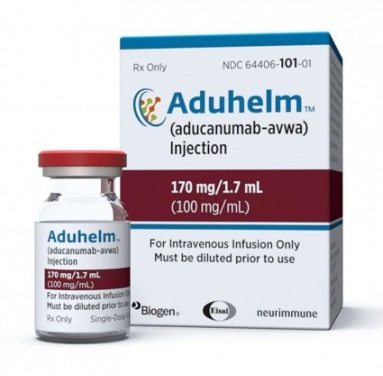The U.S. health insurance authorities finalized the policy for coverage of aducanumab and future monoclonal antibodies against Alzheimer’s disease as it had planned earlier this year.
The decision is likely to hurt Biogen, which recently released Aduhelm (aducanumab), and other drugmakers who plan to roll out drugs with the same mechanism.

On Thursday, the Centers for Medicare & Medicaid Services (CMS), under the U.S. Department of Health & Human Services (HHS), announced the final policy for monoclonal antibodies against amyloid approved by the FDA with an indication for use in treating Alzheimer’s disease.
CMS oversees national health insurance programs for 100 million people through Medicare, Medicaid, the Children’s Health Insurance Program, and the state and federal health insurance marketplaces.
The CMS policy for Medicare coverage is likely to affect Biogen’s FDA-approved Aduhelm and future monoclonal antibodies against amyloid such as lecanemab, jointly developed by Biogen and Eisai, Roche’s gantenerumab, and Lilly’s donanemab.
CMS emphasized that the National Coverage Determination (NCD) was based on an evidence-based process that collected comments from over 10,000 stakeholders and 250 peer-reviewed documents.
The NCD was made in two parts. One is Medicare coverage for drugs that win traditional FDA approval. The other is for drugs that the FDA has not determined to have shown a clinical benefit or received accelerated FDA approval.
For the former, CMS will provide “enhanced access and coverage” for people with Medicare, participating in CMS-approved trials, such as collecting data through routine clinical practice or registries.
Registry data can be used to assess whether results seen in carefully controlled clinical trials are reproduced in the real world and a broader range of patients, CMS said.
Any new drugs in this class that receive FDA traditional approval may be available in care settings that people with Medicare can use.
For the latter, Medicare will cover the use of such drugs for Medicare subscribers participating in FDA, or National Institutes of Health (NIH) approved trials.
“Under this NCD, CMS will support the FDA by covering the drug and any related services (including, in some cases, PET scans if required by trial protocol) for people with Medicare who are participating in these trials,” CMS said.
In other words, for new drugs that received accelerated approval without fully verifying a clinical benefit, such as Aduhelm, CMS will give the drug coverage and related services to Medicare users participating in a state-authorized confirmatory clinical trial.
Biogen is reportedly to begin patient screening for the Envision trial, a confirmatory study of Aduhelm, in May.
CMS said the latest decision applies to only those who have a clinical diagnosis of mild cognitive impairment (MCI) due to Alzheimer’s disease or mild dementia with a confirmed plaque in the brain. It was consistent with the use displayed on the FDA label.
“Should the FDA update the label, CMS would reevaluate the coverage policy accordingly,” CMS said.
CMS Administrator Chiquita Brooks-LaSure said that Alzheimer’s is a highly destructive disease that affects millions of U.S. people and their families.
She emphasized that CMS is responsible for ensuring that people with Medicare have equitable and appropriate access to proper treatments.
In response to the CMS’ announcement, Biogen said, “This unprecedented CMS decision effectively denies all Medicare beneficiaries access to Aduhelm, the first and only FDA-approved therapy in a new class of Alzheimer’s drugs.”
The company said that the decision might also limit coverage for any future authorized drug in the same class.
Biogen emphasized that these coverage restrictions, including the distinction between accelerated approval and traditional approval, have never been applied to FDA-authorized drugs for other disease areas.
“When additional data from this new class of treatments become available, Biogen urges CMS to reconsider today’s decision for all FDA-approved amyloid-beta targeting therapies,” the company added.
The company response was related to lecanemab, an investigational treatment for Alzheimer's that Biogen is developing with Eisai.
Eisai began to seek approval for lecanemab using FDA’s accelerated approval pathway. The company is expected to derive outcomes from the confirmatory phase 3 Clarity AD trial in the autumn of this year, observers said.

